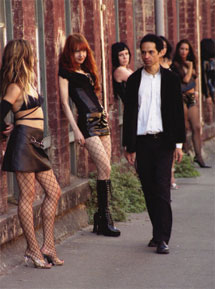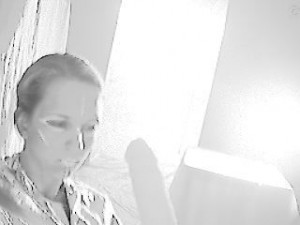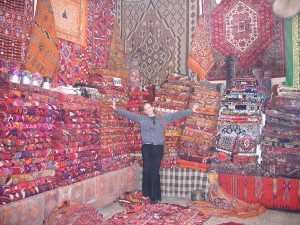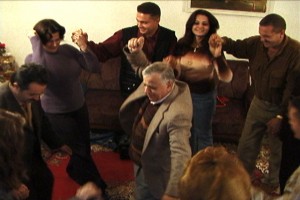OPM – Artvamp Tells All
“I’m taking a cue from Caveh. I’m going to sit here and tell you all about it.”
Here are my video reflections on the making of Other People’s Mirrors (transcript below).
And WATCH THE MOVIE HERE.
Caveh Zahedi is one of my favorite filmmakers. For those who don’t know, he’s made films like I Am A Sex Addict, Tripping with Caveh, In the Bathtub of the World. He appeared in Waking Life. Even if he’s not a household name, he’s the kind of filmmaker that other filmmakers know about. Even Alison Bechdel, who came up with the imfamous Bechdel Test for films, did a cartoon about Caveh called Is Caveh Zahedi God?
And now he’s doing a TV series called The Show About the Show.

Cahed Zahedi
Anyway, I met Caveh right after his film I Am a Sex Addict came out in 2005. I was at The Tribeca Film Festival, and my husband was receiving an award for our documentary, Nice Bombs. We saw I Am a Sex Addict, and at the time I was a sex worker, and so Caveh’s fascination with sex workers held a particular interest for me. Later he came to hang out with us in Chicago while showing his film to a sex addicts support group there, and I ended up interviewing him for a magazine called $pread.
Which brings me to why I admire him so much, and why I’ve told my husband that he’s basically the male and much more successful version – of me!
Rewind to 1998. I began writing the outline of my first feature film, Other People’s Mirrors. To understand OPM, you have to understand the structure that I had INTENDED for the film but that morphed into something totally different. It was supposed to contain three levels of experience.
The first layer was the fiction – the erotic stories I’d written that would be acted out by performers. The stories revolved around a female character named Echo, who had been implanted with a device that gave her instructions to break 12 different taboos. There was also a sort of overseer – a character only Echo could see who witnessed as she followed the instructions. His name was Narcissus and he was played by underground film legend Nick Zedd.

a performance as Echo
The final layer of experience was going to be me, using the stories as a template to go out and try to enact these scenarios in the real world, and to have a documentary cinematographer follow me as I do so.
So there was me in the real world, seeing how different my taboo sexual fantasies would be from the reality. There were the fantasies played out by actors. Then there were the actors and crew in reality, on display for an audience during the whole process via the web site. And I’d somehow cut it all together to make something beautiful that commented on porn and fantasy and voyeurism and everything.
At the time Ana Voog and Jenny from Jennycam were the best known internet celebrities, back when the internet was young. And Ana was doing stuff on her 24/7 live web cam that I found really inspiring. Her body was her art! Her images were amazing.

Ana Voog
Melissa was smart and self-protective ad we’d talk a lot about her limits and she wanted lots of reassurances that she would be respected while doing some pretty outlandish sexual acts on camera. And one day, I was having a terrible bout of PMS, and we were going over the expectations, and she was voicing some misgivings about some particular scenes.

Melissa Gira Grant
Anyway, in a fit of annoyance at everything, I said, “Look I’m not going to mother you through this, Melissa. Either do the role or don’t.”
Yeah, wrong move. It’s not like I was paying her a ton of money to do this. She was doing it because she liked what I was doing and trusted me. That trust was shattered in a matter of seconds. Because I had PMS, and I was upset at my grad advisor.
She pulled out of the project. And I was left without my lead just weeks before shooting. And so, I morphed two aspects of the movie experience into one, and a split happened in me from which I’ve never recovered.
I had to do the fictional role of Echo myself. And I had to skip the documentary aspect. I would play Echo,stage everything, with lots of improv, and shoot the whole thing against the backdrop of the city of Chicago with no permits or permission.

Under the Skin
But the result in me, in writing, directing, starring and editing OPM, while exhibiting myself on the web the entire time, was a sort of split as I said. My grad advisor was right, in a way. In the process of being watched all the time by an audience, and in the process of playing this role – I became Echo. And Echo became an escort, and the film and the web presence became a marketing device for getting more clients. And sex work took over my art practice and dissolved any objectivity I might have had in the beginning of this whole process. I saw myself as the product, rather than the work as the product.
 It’s only now, nearly 20 years later, that I can look back and say “Shit, what the hell happened there?!” Now I know why my art practice suffered. And I know why I’m not as successful as Caveh, and why I didn’t make anything nearly as good as Under the Skin, and why I have, in a sense become a little bit paralyzed at times from moving forward with my ideas.
It’s only now, nearly 20 years later, that I can look back and say “Shit, what the hell happened there?!” Now I know why my art practice suffered. And I know why I’m not as successful as Caveh, and why I didn’t make anything nearly as good as Under the Skin, and why I have, in a sense become a little bit paralyzed at times from moving forward with my ideas.
Anyway, the good news is, everyone I worked with while making OPM are doing well. My DP, Richard Bluestein, who had never shot a feature in his life before OPM, went on to create his own on-line persona called Madge Weinstein, who’s had a very successful podcast for years now. Melissa has published a few books and lots of articles and has become an advocate and activist for sex workers rights. My BFF, who back then was calling himself Witchdoctor and putting out CDs, and who played one of the main characters, while at the same time acting as Producer on the project, is now Ceven Knowles who runs Cerus Media in Berlin and has done a lot of fantastic films and music videos of his own.
And I became a producer, and supported my husband’s film career, which has taken off and he’s gotten into big film festivals and has broadcast his work on Sundance and PBS.
But I don’t think I’m done. I’m still figuring this out. I have lots of ideas and just trying to find way to accomplish them. I kinda feel like I’m starting from scratch all over again. But now I know enough NOT to snap at an actor or, most of all, not to forget my vision. So there’s that.
I’ve just released Other People’s Mirrors for the first time as download or rental. Movie extras include two short films, “Blood” and “Crying” edited from the movie’s raw footage by Usama Alshaibi. Also included are the auditions for the gang bang scene, held at the School of the Art Institute of Chicago, and captured and edited into a funny short by the film’s DP, Richard Bluestein.
69 minutes
First Released October 2002
Written, Directed, and Edited by
Kristie Alshaibi
Starring
Echo Transgression
Nick Zedd
Ceven Knowles
Vladimir Zuravel
and others…
Director of Photography
Richard Bluestein
Music by
Ceven
Synopsis
In a pseudo sci-fi trip of pornographic proportions. In Other People's Mirrors, the camera feels like an extension of the unstable characters it is following, taking on a near-home-movie style documentation of street performance and improvised art. It centers around the journey of Echo Transgression, a schizophrenic sex addict, who believes that if she follows the instructions being transmitted directly into her spine, then she will escape to her own version of nirvana. Underground legend Nick Zedd plays the alien phantom of Narcissus, a secret agent who makes sure she stays on course.
[WATCH THE MOVIE HERE]
– Kristie


 By January 2004, Usama and I found ourselves walking the streets of Baghdad. Our families in the U.S. didn’t want us to go. Usama’s mom was so upset that she temporarily disowned him. And as I breathed in the air thick with kerosine and gasoline, and nervously eyed the tanks and hyper-alert soldiers as they went searching for car bombs just a block away, I wondered just how I got there and why I was being so casual. Journalists wore bullet proof vests. I was in a jean jacket, shopping for DV tapes and mementos to take home.
By January 2004, Usama and I found ourselves walking the streets of Baghdad. Our families in the U.S. didn’t want us to go. Usama’s mom was so upset that she temporarily disowned him. And as I breathed in the air thick with kerosine and gasoline, and nervously eyed the tanks and hyper-alert soldiers as they went searching for car bombs just a block away, I wondered just how I got there and why I was being so casual. Journalists wore bullet proof vests. I was in a jean jacket, shopping for DV tapes and mementos to take home. Later Usama and I would be riding in a cab on our way home to our loft in Chicago. The cab driver bonded with Usama over their Arabness, as happened often in that diverse city. Usama introduced me as his wife and the cab driver commented that he couldn’t marry an American girl, because, as he put it, “they can’t take it hard.” Having been to the Middle East I knew what he meant on so many levels. I discovered a lot about my Americanness – about my privilege and lack of understanding – while I was there. The roles expected of women were unnerving to me. I didn’t know that as Usama’s wife there were certain actions I was expected to fulfill, and it led to Usama’s aunt saying that I thought I was “better than” them. Add that to the stress of electricity always going out, perpetually clogged toilets, blockades, curfews, the sound of guns shot in celebration and confrontation, bombs shaking the ground, being barred from certain places for being female, a bunch of socializing and being asked if I was pregnant constantly. No, I could not take it hard. As much as the family tried to make it fun, this was no vacation.
Later Usama and I would be riding in a cab on our way home to our loft in Chicago. The cab driver bonded with Usama over their Arabness, as happened often in that diverse city. Usama introduced me as his wife and the cab driver commented that he couldn’t marry an American girl, because, as he put it, “they can’t take it hard.” Having been to the Middle East I knew what he meant on so many levels. I discovered a lot about my Americanness – about my privilege and lack of understanding – while I was there. The roles expected of women were unnerving to me. I didn’t know that as Usama’s wife there were certain actions I was expected to fulfill, and it led to Usama’s aunt saying that I thought I was “better than” them. Add that to the stress of electricity always going out, perpetually clogged toilets, blockades, curfews, the sound of guns shot in celebration and confrontation, bombs shaking the ground, being barred from certain places for being female, a bunch of socializing and being asked if I was pregnant constantly. No, I could not take it hard. As much as the family tried to make it fun, this was no vacation.